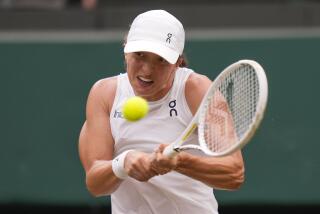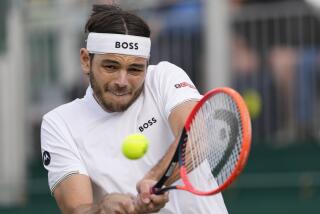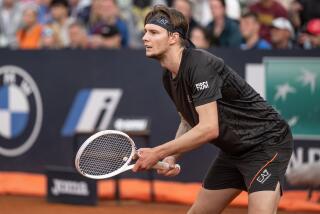Wilander Suddenly Sidetracked on His Way to Grand Slam
- Share via
WIMBLEDON, England — Mats Wilander may look like the stoical Swede, marching Borg-like to a relentless drumbeat, bringing pale-blue eyes and ice-blue blood to the storm and fury that marks the tennis tour.
But by Nordic standards, Wilander is a man of passion who knows there is life beyond the tennis court and has even experienced some of it first-hand. He laughs, he cries. His heart can skip a beat.
He had won the Australian Open, he had won the French, and he came to Wimbledon halfway to a Grand Slam and seeking more--seeking the stamp of stardom that goes with a win here.
That was when the heart skipped. He looked at the draw for his first-round match and saw his name scheduled for Centre Court alongside Slobodan Zivojinovic’s. Wilander knew it was not the way to begin at Wimbledon.
“He is the kind of player you meet at Wimbledon,” Wilander said. “I knew it would be a tough match.”
He said that Wednesday afternoon, after the obscure Yugoslav had blown him off Centre Court, after the crowd had stood to cheer as Zivojinovic gathered up his rackets as in a dream, after Wilander had lost the last nine points of the match. Give Wilander points at least for understatement.
Wilander is ranked fourth in the world and Zivojinovic 77th, but the 6-2, 5-7, 7-5, 6-0 score was not an upset of a proportion that the numbers would indicate. Zivojinovic, who was raised on a clay court in Belgrade, where his father was the groundskeeper, was nevertheless born to play on grass.
He has the big serve that can make a player on grass, the violent equalizer that can raise a certain kind of player several levels. Zivojinovic (pronounced Ge-vo-yin-o-vich), known to his friends as “Bobo,” is just such a player.
“I want to say this, I like grass and I like to play on grass,” Bobo said after delivering 16 aces.
Wilander prefers clay. Or hard court. Or any surface that doesn’t grow. There is talk about whether Wimbledon should change its grass courts to another surface, horrifying the tradition-bound. But even Wilander thinks it’s a bad idea.
“For my game, I think it’s better that they choose something different,” Wilander said. “I think it’s a good idea, if they want to kill the tournament.”
But there are these grass-court monsters, who acquit themselves so well here and so poorly almost everywhere else. Among those who have made at least the quarterfinals here are such worthies as John Sadri, Sandy Mayer, Tim Mayotte, Vijay Amritraj, Peter Fleming, Pat DuPre, Colin Dibley, et al. They all had the big serve.
But none of them won here; it takes more than a serve to achieve greatness. Bobo, who stands 6-6, may have more to his game than a rocket in his racket. For this day at least, he looked as if he could play the entire game.
He harassed Wilander with drop shots, surrounded him with passing shots, made almost every kind of shot.
When he told the assembled media that his serve was not what it usually is, Bobo drew a laugh. But he did double-fault 11 times, and still he made Wilander look too often like a man who did not know his way around a tennis court.
Bobo, of course, does. He grew up on one, the Red Star court in Belgrade. Bobo’s brother, Ceda, was also a tennis player and is now a tennis coach in Hamburg.
“The difference between me and my brother is 15 years,” said Bobo, who is 21. “I looked at him growing up and thought what fun to start to play tennis.”
He was the Yugoslav champion at every age level and is the No. 1 player today in his country. But it is only now that he seems ready to meet his obvious potential.
For Bobo, tennis was fun, except when it came to practicing. With the kind of Mediterranean features that give some women pause, Bobo was a confessed playboy. He turned pro last year, and almost no one noticed. This year, he has won $39,000 with Wojtek Fibak, a veteran tour player from Poland, as his unofficial coach. He found a girl. The results are heartening.
Bobo played on grass at the Queen’s Club earlier this month and did not fall until the semifinals. He might have done better except for an upset stomach that he can’t seem to shake. On Tuesday he saw a doctor, and on Wednesday he made Wilander slightly ill.
After winning the first set, Bobo saw his serve blow up on him, and Wilander won the second. “At that point,” Wilander said, “it depended on his serve.” The serve returned.
Holding his serve to make the score 5-5 in the third set, Bobo broke Wilander down. He won the first three points of the next game, one on a drop shot and another on a backhand passing shot. Wilander won the next two points and then sailed a passing shot just long. Wilander was broken, and Bobo won the rest of the match.
He served for the set and didn’t lose a point. Wilander, discouraged after being broken on his first serve of the fourth set, seemed to lose heart. It was not a pretty ending for a young man who plays the game with such grace.
“I am disappointed,” Wilander said, “but I try to remember that I just won the French Open.”
Wilander lost here last year in the second round to Pat Cash. This year, the end came a round earlier, and the Swede, who has twice won the Australian Open on grass, must wonder.
“To win this match, I should have been very lucky,” he said.
For Bobo, in his first Wimbledon and his first time on Centre Court, it was all like a dream. When he won, he first looked up to the friends’ box to see his brother and his fiancee, Zorica Descina. She blew him a kiss.
“We will be married in 10 to 15 days in Belgrade,” said Zorica, who is 6 1/2 months pregnant.
Zorica was not surprised. She knew that Bobo was nervous, but she also knew what would happen once the match began.
“When he crosses to the Centre Court, he feels best,” she said.
Bobo had beaten Pat Cash before. He had won Davis Cup matches before. But never before has there been anything half the equal of this.
The rain gave way most of the day to tennis. And Wimbledon tennis on this day made way for Bobo.
He was taking it all in, concluding: “After this, when you win, it’s no more a dream.”
More to Read
Go beyond the scoreboard
Get the latest on L.A.'s teams in the daily Sports Report newsletter.
You may occasionally receive promotional content from the Los Angeles Times.










